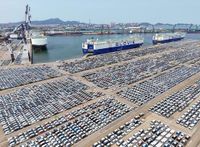In a significant move that could disrupt global supply chains, China has halted the export of critical minerals and magnets essential for various high-tech industries. This decision, effective from early April 2025, has raised alarms among U.S. firms and other nations that rely heavily on these materials for their technological applications.
According to a report by the New York Times, the Chinese government implemented the export ban on April 4, 2025, affecting six heavy rare earth metals and rare earth magnets. These materials are crucial in the production of electric vehicles, drones, computers, and military technology. The halt in exports has left numerous shipments stranded at Chinese ports, with the implications of this action sending ripples through the global market.
The new regulatory framework requires special export permits for these materials, but reports indicate that the licensing system is not yet fully operational. Michael Silver, Chairman and CEO of American Elements, revealed that his company was informed it could take up to 45 days to secure the necessary export licenses. This uncertainty has led to concerns about potential shortages of these vital resources.
China's dominance in the rare earth sector is staggering; it produced 99 percent of the world's heavy rare earth metals until 2023 and currently accounts for about 90 percent of the global production of rare earth magnets, which are significantly more efficient than traditional iron magnets. The implications of this export suspension are particularly dire for the U.S. tech industry, which has become increasingly reliant on these materials.
As the situation unfolds, U.S. officials are expressing their concerns. Kevin Hassett, a former economic advisor to President Trump, described the ban as "worrisome," indicating that the U.S. government is actively considering potential responses to mitigate the impact of this export halt. The trade tensions between the U.S. and China have escalated since the introduction of high tariffs on Chinese goods on April 2, 2025, further complicating the landscape.
This export ban is not just a bilateral issue; it has global ramifications. The materials affected are essential for a wide range of technologies, including electric motors in e-cars, steering systems in gasoline-powered vehicles, jet engines, lasers, and smartphone chips. The halt could severely disrupt supply chains in multiple high-tech industries, which are already grappling with challenges stemming from the COVID-19 pandemic.
Industry experts are voicing their fears about the long-term consequences of this ban. Erik Kirschbaum, a U.S. journalist, highlighted the critical nature of this situation, stating, "This is a very sensitive point. Americans and Europeans are going to face problems quickly." The sentiment reflects a growing recognition of the interconnectedness of global supply chains and the risks posed by geopolitical tensions.
China's decision to restrict exports is seen by many analysts as a strategic move in the ongoing trade war with the United States. While the immediate economic impact on China may be minimal—since the affected products constitute only a tiny fraction of its total exports—the potential repercussions for countries like the U.S. could be substantial. The reality is that the U.S. tech industry, which relies heavily on these materials, may find itself in a precarious position if the situation does not improve.
The ramifications of this export suspension extend beyond just the tech sector. The affected rare earth metals and magnets are crucial for various industries, including automotive manufacturing and defense technology. As companies scramble to secure alternative sources or adapt to the new regulations, the potential for increased costs and delays looms large.
As the world watches this developing story, the focus remains on how the U.S. and other affected nations will respond to China's export ban. Will they seek to establish their own sources of rare earth materials, or will they attempt to negotiate with China to ease the restrictions? The answers to these questions will shape the future of global trade and technological advancement.
In conclusion, China's suspension of exports for critical minerals and magnets marks a pivotal moment in the ongoing trade tensions with the United States. As industries brace for potential shortages and increased costs, the global reliance on China's rare earth resources becomes ever more apparent.






